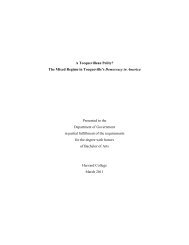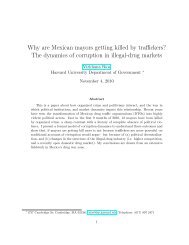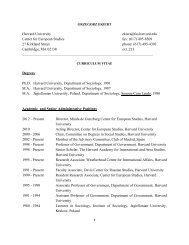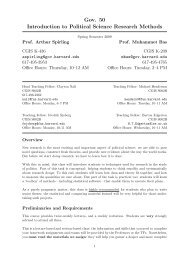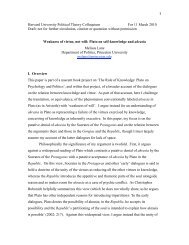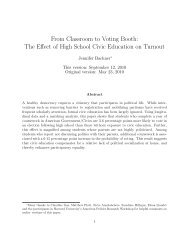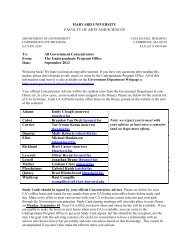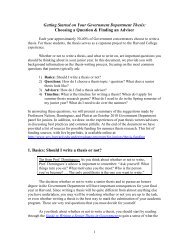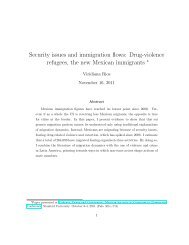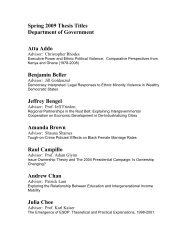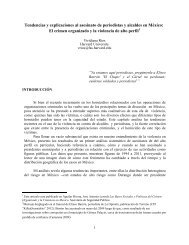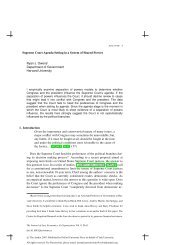2008-09 Gov Courses Cheat Sheet - Department of Government
2008-09 Gov Courses Cheat Sheet - Department of Government
2008-09 Gov Courses Cheat Sheet - Department of Government
You also want an ePaper? Increase the reach of your titles
YUMPU automatically turns print PDFs into web optimized ePapers that Google loves.
2011-12 <strong>Gov</strong> Course Summaries: Spring 2012 Page 6<br />
Course Meets Instructor Description<br />
1000-level <strong>Courses</strong> – Theory<br />
<strong>Gov</strong> 1061<br />
History <strong>of</strong> Modern<br />
Political Philosophy<br />
Tu/Th<br />
11<br />
Nancy Rosenblum<br />
Political philosophy from Machiavelli to Nietzsche, with attention to the rise and<br />
complex history <strong>of</strong> the idea <strong>of</strong> modernity. Note: This course, when taken for a letter<br />
grade, meets the General Education requirement for Ethical Reasoning or the Core area<br />
requirement for Moral Reasoning. This course fulfills the requirement that one <strong>of</strong> the<br />
eight General Education courses also engages substantially with Study <strong>of</strong> the Past.<br />
<strong>Gov</strong> 1<strong>09</strong>2<br />
Progressive<br />
Alternatives:<br />
Institutional<br />
Reconstruction Today<br />
<strong>Gov</strong> 1<strong>09</strong>3<br />
Ethics and<br />
BioTechnology<br />
<strong>Gov</strong> 11<strong>09</strong><br />
Comparative<br />
Institutional Design<br />
Tu 8-10 Roberto Mangabeira Unger (Law School) The past and future agenda <strong>of</strong> progressives, whether liberals or leftists. What should<br />
they propose now that they no longer believe that governmental direction <strong>of</strong> the<br />
economy works or that redistributive social programs suffice? A basic concern is the<br />
relation <strong>of</strong> programmatic thought to the understanding <strong>of</strong> change and constraint. Draws<br />
on several disciplines and considers examples from many contexts. The central theme<br />
this year will be innovation, education, capabilities, and creativity, as well as the<br />
policies and institutions that they require. Co-taught (through video conferencing) with<br />
Jeffrey Sachs at Columbia University and Laurence Tubiana, at Sciences Po, Paris.<br />
Note: Extended take-home examination. Offered jointly with the Law School as<br />
44605A.<br />
M 2-4 Michael Sandel and Douglas Melton Explores the moral, political, and scientific implications <strong>of</strong> new developments in<br />
biotechnology. Does science give us the power to alter human nature? If so, how should<br />
we exercise this power? The course examines the science and ethics <strong>of</strong> stem cell<br />
research, human cloning, sex selection, genetic engineering, eugenics, genetic<br />
discrimination, and human-animal hybrids. Note: May not be taken concurrently with<br />
LS 60. May not be taken for credit if LS 60 has already been taken. Moral Reasoning 22<br />
(Justice) is recommended as background. This course, when taken for a letter grade,<br />
meets the General Education requirement in Ethical Reasoning or the Core area<br />
requirement for Moral Reasoning.<br />
1000-level <strong>Courses</strong> – Comparative<br />
M 2-4 Pippa Norris (HKS) Institutional choices are vital for effective peace-building and for strengthening the<br />
quality <strong>of</strong> democratic governance. This course compares: (i) the principles and goals <strong>of</strong><br />
constitutional design; (ii) the mechanisms <strong>of</strong> institutional design (electoral rules,<br />
parliamentary and presidential executives, decentralization, and minor reforms); (iii)<br />
political processes determining institutional choices; and (iv) the consequences (for<br />
political behavior, economic performance, regime stability, the quality <strong>of</strong> governance,<br />
democracy and democratization). Materials draw upon global comparisons and selected<br />
cases from long-standing and younger liberal democracies, as well as from countries<br />
emerging from conflict.



